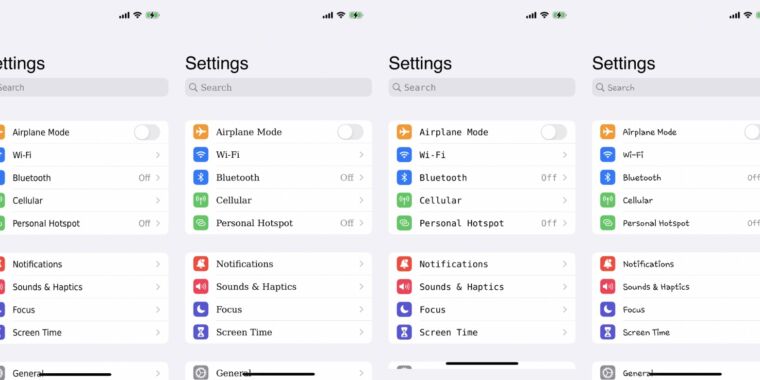Inside Russia's Vast Surveillance State: "They're Watching"
Four days after the start of the war in Ukraine, the vast Russian apparatus of surveillance and censorship was already at work.
About 800 miles east of Moscow, authorities in the Republic of Bashkortostan, one of Russia's 85 regions, were busy listing the mood for comments in social media posts. They annotated YouTube posts they said criticized the Russian government. They noted the reaction to a local protest.
Then they compiled their findings. A report on the “destabilizing of Russian society” pointed to an editorial from a news site deemed “opposed” to the government that said President Vladimir V. Putin was pursuing his own interest by invading Ukraine. A file elsewhere in the file detailed who owned the site and where they lived.
Another February 28 dispatch, titled “Presence of Moods of Protest,” warned that some had expressed support for the protesters and “talked about the need to stop the war.”
The report was among nearly 160,000 records from the Bashkortostan office of Russia's powerful internet regulator, Roskomnadzor.
Together, the documents detail the inner workings of a critical facet of Mr. Putin's surveillance and censorship system, which his government uses to find and track opponents, crush dissent and even suppress independent news within the confines of the country.
Leak of agency documents "is like a small keyhole in the true extent of internet censorship and surveillance in Russia", said Leonid Volkov, who is named in the record and is the chief of staff of imprisoned opposition leader Aleksei A. Navalny.
"It's a lot bigger," he said.
Roskomnadzor's activities have catapulted Russia, along with authoritarian countries like China and Iran, to the forefront of nations that aggressively use technology as a tool of repression. Since the agency was established in 2008, Mr Putin has used it as a key lever to tighten his grip on power while transforming Russia into an even more authoritarian state.
The internet regulator is part of a larger technological apparatus that Mr Putin has built over the years, which also includes a nationwide spy system that intercepts phone calls and internet traffic, online disinformation campaigns and hacking into the government systems of other nations.
The agency's role in this digital net is more extensive than previously known, according to the records. It has morphed over the years from a sleepy telecoms regulator into a full-fledged intelligence agency, closely monitoring websites, social media and news outlets, calling them "pro-government," anti-government" or "apolitical".
Roskomnadzor also worked to unmask and monitor the people behind anti-government accounts and provided detailed information about the critics' online activities to security agencies, the documents show. This complemented real-world actions, with those being monitored being attacked for speaking out online. Some were then arrested by the police and detained for months. Others have fled Russia for fear of prosecution.

Four days after the start of the war in Ukraine, the vast Russian apparatus of surveillance and censorship was already at work.
About 800 miles east of Moscow, authorities in the Republic of Bashkortostan, one of Russia's 85 regions, were busy listing the mood for comments in social media posts. They annotated YouTube posts they said criticized the Russian government. They noted the reaction to a local protest.
Then they compiled their findings. A report on the “destabilizing of Russian society” pointed to an editorial from a news site deemed “opposed” to the government that said President Vladimir V. Putin was pursuing his own interest by invading Ukraine. A file elsewhere in the file detailed who owned the site and where they lived.
Another February 28 dispatch, titled “Presence of Moods of Protest,” warned that some had expressed support for the protesters and “talked about the need to stop the war.”
The report was among nearly 160,000 records from the Bashkortostan office of Russia's powerful internet regulator, Roskomnadzor.
Together, the documents detail the inner workings of a critical facet of Mr. Putin's surveillance and censorship system, which his government uses to find and track opponents, crush dissent and even suppress independent news within the confines of the country.
Leak of agency documents "is like a small keyhole in the true extent of internet censorship and surveillance in Russia", said Leonid Volkov, who is named in the record and is the chief of staff of imprisoned opposition leader Aleksei A. Navalny.
"It's a lot bigger," he said.
Roskomnadzor's activities have catapulted Russia, along with authoritarian countries like China and Iran, to the forefront of nations that aggressively use technology as a tool of repression. Since the agency was established in 2008, Mr Putin has used it as a key lever to tighten his grip on power while transforming Russia into an even more authoritarian state.
The internet regulator is part of a larger technological apparatus that Mr Putin has built over the years, which also includes a nationwide spy system that intercepts phone calls and internet traffic, online disinformation campaigns and hacking into the government systems of other nations.
The agency's role in this digital net is more extensive than previously known, according to the records. It has morphed over the years from a sleepy telecoms regulator into a full-fledged intelligence agency, closely monitoring websites, social media and news outlets, calling them "pro-government," anti-government" or "apolitical".
Roskomnadzor also worked to unmask and monitor the people behind anti-government accounts and provided detailed information about the critics' online activities to security agencies, the documents show. This complemented real-world actions, with those being monitored being attacked for speaking out online. Some were then arrested by the police and detained for months. Others have fled Russia for fear of prosecution.
What's Your Reaction?















![Three of ID's top PR executives quit ad firm Powerhouse [EXCLUSIVE]](https://variety.com/wp-content/uploads/2023/02/ID-PR-Logo.jpg?#)







